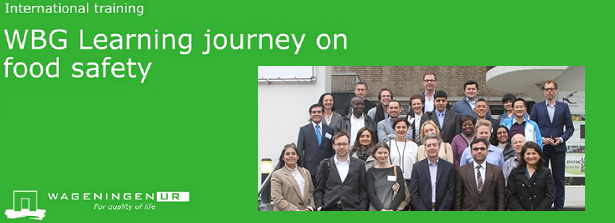Food safety central theme of World Bank Learning tour

From November 9 to 13, a group of around 30 experts from the World Bank Group came to the Netherlands for a Learning tour on food safety. This was the first activity under the “Food for All Partnership” between the World Bank and the Netherlands.
Participants in the group were programme coordinators, investment officers and food safety specialists with responsibilities for food security and agriculture in the Bank’s regional offices and headquarters, as well as clients and partners working with World Bank in several countries and a few Dutch embassy staff and clients.1
Programme
A full week programme had been designed by Wageningen UR Centre for Development Innovation, consisting of lectures by Dutch food safety experts (Dutch Food Safety Authority, for example) as well as excursions and debates. You can download the full programme (PDF) here. According to the participants’ feedback it was a “very rich and comprehensive programme” which “made clear that food safety and agri-food production and trade are closely linked” and that “we are able to make our projects more equitable and food secure if we address food safety with our stakeholders”.
Development impact of food safety interventions
During a discussion session at the Ministry of Foreign Affairs, an interesting exchange took place about the development impact of food safety interventions, based on recent research presented by Mr Steven Jaffee of World Bank and Mr Niek van Dijk of BoPInc.
In his presentation “Making the Grade: African Smallholders, Agro-Food Standards and Development Assistance”, Jaffee highlighted that currently, most interventions for improved food safety in LMICs focus on only a very small percentage of agricultural value chains, i.e. on the high end of the spectrum. Whereas the big majority of producers and SMEs operates at a smaller and less sophisticated scale, produces food for the majority of consumers, and hardly receives any support to improve on quality or safety. In addition, most “voluntary” international standards are also clustered at the medium to high end of the spectrum. According to Jaffee, it would be highly cost-effective to implement food safety measures targeted at smaller producers and SMEs.
The BoPInc research in Bangladesh, implemented within the Food & Business Knowledge Platform (F&BKP), resulted in recommendations for measures that projects currently can take to increase food quality and linkage of smallholders, while preventing them from being crowded out.
Knowledge and innovation
The F&BKP Office facilitated a specific workshop in the session “Knowledge and innovation”. The ways of working within the Platform and the current Knowledge Agenda were explained. In their response, World Bank staff showed an interest in further exchange about the effective design of knowledge systems on food and agriculture, and mentioned cases of countries that had been successful in connecting research with practice, such as Colombia. They also indicated an interest in the Food & Business Applied Research Fund, and said specific follow-up exchange on Food Safety as a theme would be valuable.
Report
Please download the report (PDF) of the Food for All Partnership – Learning Journey on Food Safety.
Follow-up
In 2016, World Bank and the Netherlands will continue collaborating in the context of the “Food for All Partnership”. The detailed report of the Learning tour will be available in January 2016, including the key lessons learned and potential areas for follow-up.
Some links to social media messages about the Learning journey:
World Bank visits Wageningen UR to learn on food safety
News – Wageningen UR – November 11, 2015
Tweet
Marcel Beukeboom – November 11, 2015
World Bank officials learn about Natural Livestock Farming
News – Natural Livestock Farming – November 2015
Footnotes
- 1. Participants in the group were from World Bank Group as well as clients and partner institutions in Africa (3), South Asia (4), South East Asia (4), Europe and Central Asia (6), Latin America (2) and Washington DC Headquarters (9).





